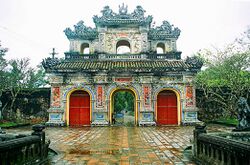Kiếm Hoà Dynasty: Difference between revisions
BattlerNonna (talk | contribs) mNo edit summary |
BattlerNonna (talk | contribs) mNo edit summary |
||
| Line 112: | Line 112: | ||
{{History of Quenmin}} | {{History of Quenmin}} | ||
The '''Kiếm Hoà dynasty''' ({{wp|Vietnamese language|Vietnamese}}: ''Nhà Kiếm Hoà'') was a imperial [[Quenmin]]ese dynasty that was formed in 1267 during the waning years of the [[Anarchy | The '''Kiếm Hoà dynasty''' ({{wp|Vietnamese language|Vietnamese}}: ''Nhà Kiếm Hoà'') was a imperial [[Quenmin]]ese dynasty that was formed in 1267 during the waning years of the [[Third Quenminese Anarchy]]. It ruled over Quenmin for 104 years, and possessed an extensive empire that stretched from the Quenminese homeland to Tennai facing the [[Ruadak Sea]]. The dynasty also formed a {{wp|personal union}} with the [[Arantho Kingdom]] until the latter's independence in 1358, with the dynasty's rulers taking {{wp|Thai language|Tamauese}} or {{wp|Sanskrit}} regnal names. Due to this, the Dynasty also earned the Tamauese name '''Khewinphumiphrakun Dynasty''' (ราชวงศ์ เควนกหเวนผู้มีพระคุณ; ''Ratchawong Khewinphumiphrakun''), from one of their titles that translates to "Quenic Benefactor." | ||
[[Kiều Thạc Nhu]], who was Countess of Khoái Siêu, proclaimed herself Empress of the newly-formed dynasty to reunify [[Đại Quến]] during the | [[Kiều Thạc Nhu]], who was Countess of Khoái Siêu, proclaimed herself Empress of the newly-formed dynasty to reunify [[Đại Quến]] during the Anarchy. The other warlords challenged her, but ended with their defeat during her [[Hodenic Wars|campaigns against them]]. She then relocated the dynasty's capital to [[Campho]], the traditional seat for Quenminese emperors of the past. Years later, the neighboring [[Tuntayakul Kingdom]]<!--- Preceding kingdom was the Uttarachinburi Kingdom ---> was subjected to Kiếm Hoà sovereignty at the end of the [[Kiem Hoa-Tuntayakul War]] and [[Tuntayakul dynasty|its dynasty]] was overthrown. Nhu subsequently established a {{wp|personal union}} with the Tayamese via the creation of the [[Arantho Kingdom]], permitting self-governance while its people recognized her rule and accorded to the dynasty's foreign policies; this was considered a rarity among the Quenminese dynasties. Nhu then expanded further south to subjugate the [[Nambyan Republic]] and gain territory from the [[Tennaiite Campaign of Kieu Thac Nhu|Rideva Empire]]. After her assassination, Đại Quến managed to recover from the Anarchy and become an immensely prosperous state, surpassing that of the [[Liễu Dynasty]]. Rule shifted from the [[House of Kiều Thạc]] to the [[House of Đường Bộ]] after the deposition of [[Bảo Hưng]], bearing resemblance to the succeeding dynasties of the ancient [[Hồng Bàng dynasty (Quenmin)|Hồng Bàng era]]. The dynasty's greatest extent was reached under [[Chính Phúc]], Đường Bộ's first monarch. | ||
The personal union lasted until the independence of the [[Mahathum Kingdom]] during the rule of [[Xương Phù]] in 1358. Despite the loss of the Arantho Kingdom, the dynasty still prospered with its economy recovering quickly under [[Chượng Tông]]'s reign. The final house to rule the dynasty was [[Thái Lam clan]], and while producing several successful emperors, most were underperforming or inept. Eventually, the dynasty lost its power and influence in 1440 under the rule of [[Tôn Lễ]], with several noble families establishing their own dynasties in the [[Northern and Southern Dynasties (Quenmin)|Nothern and Southern Dynasties Era]]. | The personal union lasted until the independence of the [[Mahathum Kingdom]] during the rule of [[Xương Phù]] in 1358. Despite the loss of the Arantho Kingdom, the dynasty still prospered with its economy recovering quickly under [[Chượng Tông]]'s reign. The final house to rule the dynasty was [[Thái Lam clan]], and while producing several successful emperors, most were underperforming or inept. Eventually, the dynasty lost its power and influence in 1440 under the rule of [[Tôn Lễ]], with several noble families establishing their own dynasties in the [[Northern and Southern Dynasties (Quenmin)|Nothern and Southern Dynasties Era]]. | ||
Revision as of 07:46, 13 October 2020
This article is incomplete because it is pending further input from participants, or it is a work-in-progress by one author. Please comment on this article's talk page to share your input, comments and questions. Note: To contribute to this article, you may need to seek help from the author(s) of this page. |
Kiếm Hoà Dynasty Ratchawong Khewinphumiphrakun 劍和朝 ราชวงศ์ เควนกหเวนผู้มีพระคุณ | |||||||
|---|---|---|---|---|---|---|---|
| 1267–1440 | |||||||
|
Flag | |||||||
| File:KiemHoaDynasty-Map.png | |||||||
| Capital | |||||||
| Common languages | Quenminese | ||||||
| Government |
| ||||||
| Emperor | |||||||
• 1267-1300 | Chuyển Bình | ||||||
• 1304-24 | Chính Phúc | ||||||
• 1436-40 | Tôn Lễ | ||||||
| Legislature | Imperial Court | ||||||
• Upper House | Advisory Council | ||||||
• Lower House | Council of Lords | ||||||
| History | |||||||
• Establishment of the Dynasty | 14 February 1267 1267 | ||||||
• Succession by the House of Đường Bộ | 24 July 1339 | ||||||
• Independence of the Mahathum Kingdom | 18 September 1358 | ||||||
| 19 May 1440 1440 | |||||||
| Currency | Văn | ||||||
| |||||||
Part of a series on the |
|---|
| History of Quenmin |
 |
The Kiếm Hoà dynasty (Vietnamese: Nhà Kiếm Hoà) was a imperial Quenminese dynasty that was formed in 1267 during the waning years of the Third Quenminese Anarchy. It ruled over Quenmin for 104 years, and possessed an extensive empire that stretched from the Quenminese homeland to Tennai facing the Ruadak Sea. The dynasty also formed a personal union with the Arantho Kingdom until the latter's independence in 1358, with the dynasty's rulers taking Tamauese or Sanskrit regnal names. Due to this, the Dynasty also earned the Tamauese name Khewinphumiphrakun Dynasty (ราชวงศ์ เควนกหเวนผู้มีพระคุณ; Ratchawong Khewinphumiphrakun), from one of their titles that translates to "Quenic Benefactor."
Kiều Thạc Nhu, who was Countess of Khoái Siêu, proclaimed herself Empress of the newly-formed dynasty to reunify Đại Quến during the Anarchy. The other warlords challenged her, but ended with their defeat during her campaigns against them. She then relocated the dynasty's capital to Campho, the traditional seat for Quenminese emperors of the past. Years later, the neighboring Tuntayakul Kingdom was subjected to Kiếm Hoà sovereignty at the end of the Kiem Hoa-Tuntayakul War and its dynasty was overthrown. Nhu subsequently established a personal union with the Tayamese via the creation of the Arantho Kingdom, permitting self-governance while its people recognized her rule and accorded to the dynasty's foreign policies; this was considered a rarity among the Quenminese dynasties. Nhu then expanded further south to subjugate the Nambyan Republic and gain territory from the Rideva Empire. After her assassination, Đại Quến managed to recover from the Anarchy and become an immensely prosperous state, surpassing that of the Liễu Dynasty. Rule shifted from the House of Kiều Thạc to the House of Đường Bộ after the deposition of Bảo Hưng, bearing resemblance to the succeeding dynasties of the ancient Hồng Bàng era. The dynasty's greatest extent was reached under Chính Phúc, Đường Bộ's first monarch.
The personal union lasted until the independence of the Mahathum Kingdom during the rule of Xương Phù in 1358. Despite the loss of the Arantho Kingdom, the dynasty still prospered with its economy recovering quickly under Chượng Tông's reign. The final house to rule the dynasty was Thái Lam clan, and while producing several successful emperors, most were underperforming or inept. Eventually, the dynasty lost its power and influence in 1440 under the rule of Tôn Lễ, with several noble families establishing their own dynasties in the Nothern and Southern Dynasties Era.
History
Ascension of Kiều Thạc Nhu
Dual monarchy
Return to single monarchy
Rule of the Thái Lam clan and decline
Administration
Military
Culture
Education
List of Emperors
| Portrait | Era Name | Tamauese Regnal Name | Full Tamauese Regnal Name | Birth Name | House | Reign | Temple Name | Posthumous Name |
|---|---|---|---|---|---|---|---|---|

|
囀平 Chuyển Bình |
Rajadhidevi ราชธิดา |
Somdet Phra Boromma Rajini Rajadhidevi Mahitalathibet Khewinphumiphrakun สมเด็จ พระ บรมราชินี นาถราชเทวี รามาธิบดี เควนกหเวนผู้มีพระคุณ |
Kiều Thạc Nhu | Kiều Thạc | 1267-1300 | 戰祖 Chiến Tổ |
世明天至宅武成運豐大皇厚 Thể Minh Thiên Hanh Trạch Vận Chí Thành Phong Đại Hoàng Hậu |
| 洪正 Khang Xuất |
Prakaramardin I เครื่องพิมพ์ดีด ๑ |
Somdet Phra Prakaramardin Nueng Mahitalathibet Khewinphumiphrakun สมเด็จ พระ เครื่องพิมพ์ดีด ๑ รามาธิบดี เควนกหเวนผู้มีพระคุณ |
Kiều Thạc Kiểm | Kiều Thạc | 1300-1316 | 慶宗 Khánh Tông |
||
| 天符睿武 Thiên Phù Duệ Vũ |
Suriyenthrathibodi I สุริเยนทราธิบดี ๑ |
Somdet Phra Mahitalathibet Suriyenthrathibodi Nueng Khewinphumiphrakun สมเด็จ พระ รามาธิบดี สุริเยนทราธิบดี ๑ เควนกหเวนผู้มีพระคุณ |
Kiều Thạc Kiểm | Kiều Thạc | 1316-1337 | 明宗 Minh Tông |
||
| 寶興 Bảo Hưng |
Suriyenthrathibodi II สุริเยนทราธิบดี ๒ |
Somdet Phra Mahitalathibet Suriyenthrathibodi Song Khewinphumiphrakun สมเด็จ พระ รามาธิบดี สุริเยนทราธิบดี ๒ เควนกหเวนผู้มีพระคุณ |
Kiều Thạc Ích | Kiều Thạc | 1337-1339 | 喁祖 Ngung Tổ |
||

|
正福 Chính Phúc |
Borommarachathirat IV บรมราชาธิราชที่ ๔ |
Somdet Phra Mahitalathibet Borommarachathirat Si Khewinphumiphrakun สมเด็จ พระ รามาธิบดี บรมราชาธิราชที่ ๔ เควนกหเวนผู้มีพระคุณ |
Đường Bộ Lĩnh | Đường Bộ | 1339-1355 | 宅祖 Trạch Tổ |
|
| 昌符 Xương Phù |
Prakaramardin II เครื่องพิมพ์ดีด ๒ |
Somdet Phra Mahitalathibet Prakaramardin Song Khewinphumiphrakun สมเด็จ พระ รามาธิบดี เครื่องพิมพ์ดีด ๒ เควนกหเวนผู้มีพระคุณ |
Đường Bộ Kiểm Kỳ | Đường Bộ | 1355-1360 | 昌祖 Xương Tổ |
||
| 哲宗 Chượng Tông |
— | — | Đường Bộ | |||||
| 聖嘉慶 Thánh Gia Khánh |
— | — | Đường Bộ Liên | Đường Bộ | 孝宗 Hiếu Tông |
|||
| 紹光 Thiệu Quang |
— | — | Đường Bộ Kinh Nhất | Đường Bộ | 1367-1371 | 昌宗 Xương Tông |